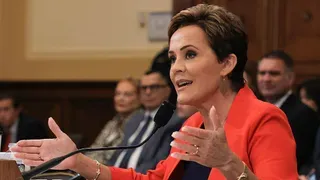March 11, 2013
LGBT Students Make Gains at U.S. Catholic Colleges
Dan Meyer READ TIME: 6 MIN.
The relationship between religion and homosexuality has always been a contentious one, but nowhere is the debate more active than on college campuses. Catholic-affiliated universities across America are forced to deal with traditional church doctrine while at the same time must support a modern and progressive student body.
One student group success story recently occurred at a small Catholic-affiliated college in San Antonio. School administrators at Our Lady of the Lake University approved a change to its student handbook that includes protections for people based on sexual orientation and gender identity.
Amanda Beschonet, former president of the OLLU Alliance, a gay-straight group on campus, said the process took nearly a year but was well worth the wait.
In January 2012, the group decided to take a look at whether they were protected in the school's policies and noticed that sexual orientation, gender identity and expression were missing.
"A lot of the decisions were made behind closed doors," Beschonet said. "So we weren't able to have a lot of conversations with the people who were doing the voting."
Jack Hank, the vice president of student life, was in charge of any programs in addition to the student handbook. "We had to do a little bit of educating," Beschonet explained. "He wasn't really sure of the difference between gender and gender identity."
The university didn't "understand what a big deal it is," she added. The feedback from students has been generally supportive, although minimal. Since the university is private, there's been no big reveal on campus regarding the policy change.
Thanks to press from TexasEquality and Texas Public Radio, nearby colleges have reached out to OLLU Alliance for advice on how to get their own policies changed, Beschonet added.
Boston College Incident Shows Progress & Problems
Still, not all college campuses are making strides. Despite its reputation as one of the more supportive campuses for LGBT students in America, Boston College recently suffered a major setback. Despite its name, BC is a Jesuit school that is considered among the elite schools of higher learning in a city teeming with them.
Over Martin Luther King weekend, the LGBT Center at BC's Law School was the target of vandalism that included homophobic graffiti covering the walls. The administration has been strikingly supportive of the victims, with the incident being actively investigated. As of this writing, no one has been apprehended.
Despite this recent event, the school is lucky to be ungoverned by the Catholic Church directly. The Jesuits traditionally do not report to the local bishop but rather to their own officers in Rome. Other schools, such as the Catholic University of America, report directly to the archdiocese. As McGargh explained,
"There is no one in the chain of command in the Catholic Church who can have anything to say about what happens at Boston College," according to John McGargh, BC assistant professor of theology at the school.
The president and Board of Trustees, however, are priests or active members of the laity. In addition, devout Catholic alumni and Boston Archbishop Cardinal O'Malley influence BC's interpretation of doctrine. This has resulted in controversies such as the decision not to renew the teaching contract last year of Father John Shea, who has argued for the ordination of women.
Contradictions at Boston College
On the one hand, the school supports a Gay Leadership Council, in direct defiance of the Church's position on all matters gay. There is also an association for LGBT faculty, staff and administrators, who have been invited to contribute to discussions about diversity at the school.
On the other hand, there is a reluctance to allow a social group for gays and lesbians, McGargh admitted. For many years, there was hesitation to allow a dance for LGBT students. When asked why, McGrath said it was because dances are perceived to be foreplay for sexual activity.
A cursory Google search, however, reveals several dances. Neighbors of the campus would be surprised to hear dance parties are discouraged, since, as local news site reported, forced college representatives to apologize for a raucous college-sponsored party that caused dozens of calls to the police.
McGargh pointed out that an LGBT dance has been held off-campus for the past few years.
Despite such contradictions, the campus has certainly come a long way since the 1980s, when students received death threats from other students for coming out. "The fact of the matter is we have a very concerned campus, now," McGargh argued. He praised the support offered by counselors, student affairs and campus police about the vandalism incident.
As for other Catholic campuses spread across the United States, there's generally support for LGBT communities. Chicago's Loyola University and Santa Clara University in California's Silicon Valley are examples of schools much more progressive than Boston College, according to McGrath. Others, however, like Franciscan University in Steubenville, Ohio, and Catholic University of America in Washington, D.C., adhere to strict anti-gay doctrine that directly affects student life. This is why McGrath believes that BC compares favorably to "some of the more conservative Catholic universities"; he puts its policies generally "somewhere in the middle."
The way church doctrine can infiltrate professional training came into focus last September when Franciscan University came under fire for a course entitled "Deviant Behavior" that lumped homosexuality in with murder, rape and mental illness.
The Franciscan University of Steubenville's Gay Alliance requested the university change its description, but, as Daily Kos and others reported, the university sent the group a letter asking them to cease and desist. Not only that, but the college's Gay Alliance no longer has a Facebook page and the email address listed on the group's home page is no longer in service.
The college changed the course description two months after the controversy erupted. In a statement, the school's academic affairs officer, tried to split the baby, as it were. The language was "not in accord with Catholic Church teaching, which calls us to treat those with homosexual tendencies with 'respect, compassion, and sensitivity.'"
The officer immediately added, however, that "at the same time, the Church teaches that homosexual acts 'are contrary to the natural law. Under no circumstances can they be approved.' Thus, we found no contradiction in updating the course description while continuing to teach the Church's teaching on sexuality."
Students Unite in Local & National Groups
At the Catholic University of America, CUAllies, an LGBT student-run group, has been declined official recognition multiple times by administrators. As reported by Metro Weekly, the reason given are fears that the group may turn into an advocacy organization rather than merely a support group.
Students are fighting back against such incidents by banding together to form the Catholic Association of Students for Equality, or CASE. The group, launched on National Coming Out Day in October of last year, sees itself as pulling together local campus LGBT student-run groups at Catholic-affiliated colleges across the country.
The group's Facebook page stated that "We were taught to believe in family, love, and commitment; to work to ensure respect, inclusion, and human dignity. Therefore, it is only natural that as we grew into adults we would apply these values to how we viewed our LGBTQ identities."
Fordham Leads the Way
Other universities seem to be on a normal pace for equality progress. Fordham University, an elite university in New York City, has a very active LGBT student-run group. It should be noted that, although Fordham is nominally Jesuit and popularly regarded as a Catholic university, it is officially independent.
When Dan Drolet took the reins of the Lesbian, Gay, Bisexual, Transgender and Ally Network of Support, it lacked focus, according to him. In three years -- and with full support of the administration -- the group helped LGBT students come out. Significantly, the university itself promotes the group on its website.
The Jesuits, who have been historically regarded as in the vanguard of Catholic intellectual activity and social activism, might be the determining factor in LGBT acceptance. "Fordham is in the Jesuit tradition, which values thoughtfulness and social justice," said Drolet. "This shone through during my time at Fordham. I don't mean to 'pink wash' Fordham."
The university still has a long way to go, he said. Overall, however, he's satisfied with the way the university has accepted and even fostered LGBT acceptance.
Even in non-Jesuit universities, LGBT student groups can find many allies these days. The key, Drolet noted, is identifying such allies, and mobilizing and encourage them to make their voices heard. Drolet acknowledged that in the top-down firmly hierarchal Roman Catholic church, it can be difficult to create change, "But it is possible," said Drolet, who cited the Church's social activism.
Although many readers of this website have good cause to criticize the Church, Catholic priests and laity have been in the vanguard of movements such as Liberation Theology in developing nations. American bishops have come out for the rights of workers. And one of the most prominent left-wing Catholics of the late 20th century, New Yorker Dorothy Day, is being considered for sainthood.
While change in the Catholic Church's blanket condemnation of homosexual sex and marriage is remote, its colleges will continue to attract LGBT students and enlightened straight allies. The schools that discourage coming out or LGBT groups risk becoming academic backwaters. And that may the strongest argument for change.
Dan Meyer is a young professional whose stories have appeared in publications such as The Advocate online and UCLA's LGBT magazine entitled "OutWrite." He is also a part-time ESL teacher in Boston.



